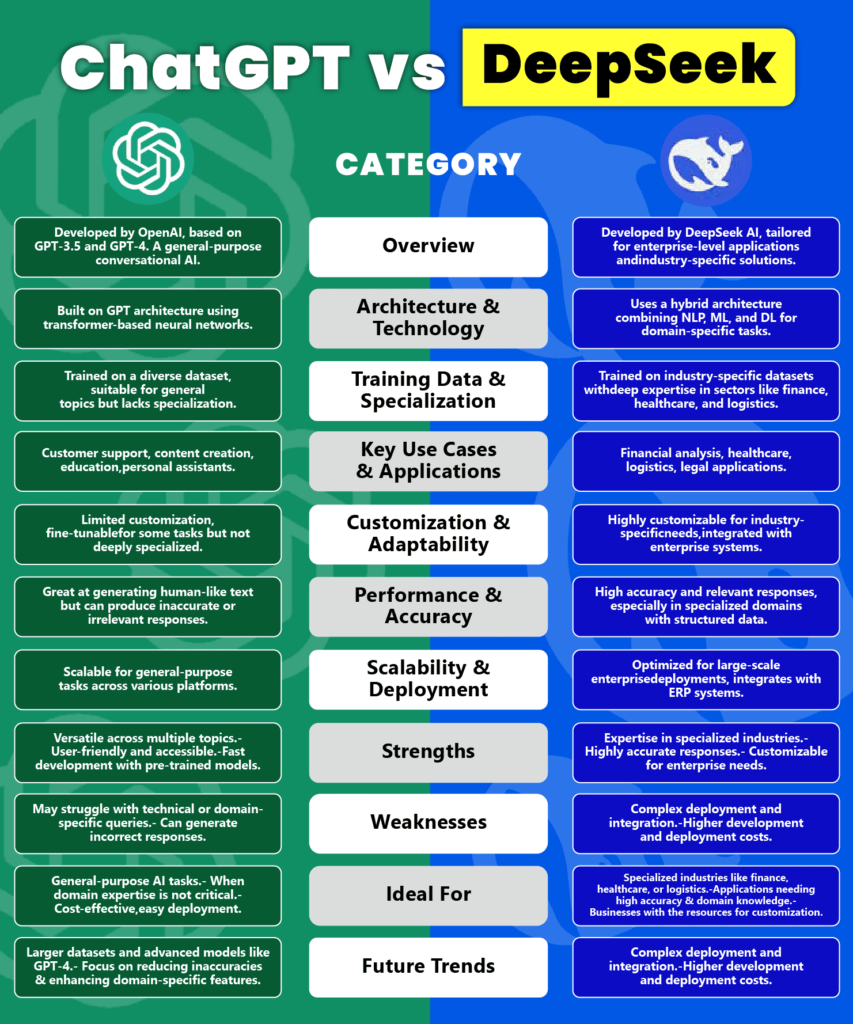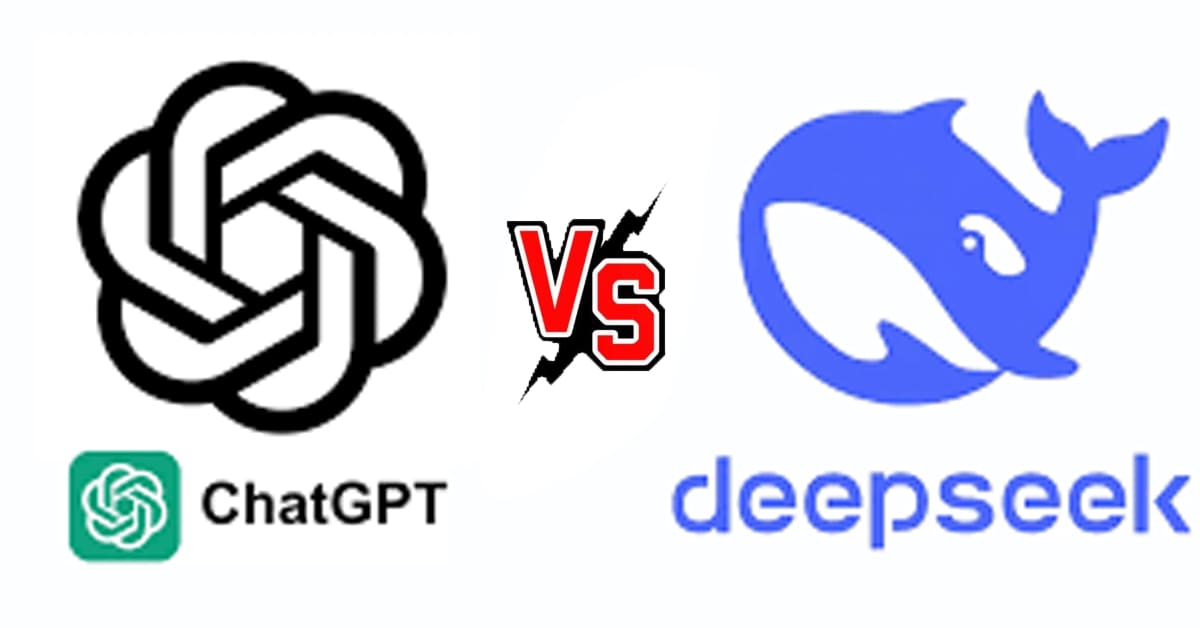Artificial Intelligence (AI) is changing how we interact with technology, and conversational AI models like ChatGPT and DeepSeek are leading this transformation. Though both aim to enable human-like interactions, they differ significantly in their structure, abilities, and applications.
Let’s explore an in-depth comparison between ChatGPT vs DeepSeek, analyzing their differences in architecture, use cases, performance, and specialization.
ChatGPT and DeepSeek: An Overview
What is ChatGPT?
ChatGPT, crafted by OpenAI, is a top-tier conversational AI model built on the Generative Pre-trained Transformer (GPT) architecture, specifically the GPT-3.5 and GPT-4 models. It’s designed to generate text that reads like human conversation, making it perfect for customer support, content creation, education, and personal assistants.
What is DeepSeek?
DeepSeek, developed by DeepSeek Artificial Intelligence Co., Ltd., is tailored for enterprise-level applications and offers industry-specific solutions. It excels at handling complex queries, data analysis, and decision-making tasks in sectors like finance, healthcare, and logistics.
Key Differences Between ChatGPT and DeepSeek
Architecture and Technology
ChatGPT: Utilizes the GPT architecture with transformer-based neural networks trained on extensive text data. It predicts the next word in a sentence through unsupervised learning, allowing it to generate coherent and relevant responses.
DeepSeek: Combines natural language processing (NLP) with machine learning (ML) and deep learning (DL) techniques in a hybrid architecture. It’s optimized for domain-specific tasks, merging structured and unstructured data for precise insights.
Training Data and Specialization
ChatGPT: Trained on diverse datasets including books, articles, and websites. It’s a general-purpose model adept at various topics but may lack depth in specialized fields.
DeepSeek: Focuses on industry-specific datasets, tailored for tackling complex, domain-specific challenges. In finance, it can analyze market trends; in healthcare, it assists with medical diagnoses.
Use Cases and Applications
ChatGPT: Ideal for general conversational tasks such as:
- Customer support: Automating FAQ responses.
- Content creation: Generating articles, blogs, and social media posts.
- Education: Offering explanations and tutoring.
- Personal assistants: Helping with daily tasks.
Also Read : Exploring the Capabilities of ChatGPT
DeepSeek: Suited for enterprise-level applications such as:
- Financial analysis : Predicting market trends and risk assessments.
- Healthcare : Assisting in diagnostics and treatment recommendations.
- Logistics : Optimizing supply chain operations.
- Legal : Analyzing contracts and legal documents.
Customization and Adaptability
ChatGPT: Limited customization for specific industries. While it can be fine-tuned, its general-purpose design makes it less suitable for specialized tasks.
DeepSeek: Highly customizable and adaptable to specific industries. It integrates well with enterprise systems and meets unique business needs.
Performance and Accuracy
ChatGPT: Excels in generating human-like text and managing open-ended conversations but may sometimes produce inaccurate responses due to reliance on general training data.
DeepSeek: Delivers accurate and relevant responses in specialized domains. Integrates structured data for better performance in data-driven tasks.
Scalability and Deployment
ChatGPT: Scalable for general applications, deployable across web, mobile apps, and chatbots.
DeepSeek: Optimized for large-scale enterprise deployments, handling high-volume, complex queries. Often integrated into enterprise resource planning (ERP) systems.

Strengths and Weaknesses
Strengths of ChatGPT:
- Versatility: Handles a wide range of topics.
- Ease of Use: Accessible for non-technical users.
- Rapid Development: Pre-trained models reduce development time.
Weaknesses of ChatGPT:
- Lack of Specialization: May struggle with technical queries.
- Accuracy Issues: Can generate incorrect responses.
Strengths of DeepSeek:
- Domain Expertise: Excels in specialized industries like finance and healthcare.
- High Accuracy: Delivers precise responses in complex scenarios.
- Customizability: Tailored to meet specific business needs.
Weaknesses of DeepSeek:
- Complex Deployment: Requires integration with enterprise systems.
- Higher Costs: More expensive to develop and deploy compared to general models.
Pros and Cons between ChatGPT and DeepSeek
| Feature | DeepSeek | ChatGPT |
| Pros | Open-source and cost-effective | Strong contextual understanding and refined language generation |
| Efficient for coding and technical tasks | Reliable for general research and writing tasks | |
| Faster response times for structured queries | Better integration with multimodal capabilities (e.g. images voice) | |
| Superior performance in mathematical computations | More user-friendly interface | |
| Lower resource requirements | Consistent performance across various tasks | |
| Cons | Potential biases in politically sensitive topics | Subscription required for premium access |
| Requires more verification for complex responses | Higher computational costs | |
| Less intuitive interface for casual users | Message limits on free usage | |
| Stricter content moderation policies | Can be slower for technical computations |
Who is the Winner between ChatGPT and DeepSeek
| Feature | DeepSeek | ChatGPT | Winner |
| Model Architecture | Uses MoE approach with selective parameter activation | Traditional transformer model with consistent performance | Both (different strengths) |
| Data Visualization | Concise fact-driven outputs | Rich contextual presentations with better formatting | ChatGPT |
| Technical Performance | Superior in mathematics and coding tasks | Strong general performance across tasks | DeepSeek |
| User Experience | Technical interface requiring expertise | User-friendly interface with broad accessibility | ChatGPT |
| Cost Efficiency | Open-source and free to use | Subscription-based with usage limits | DeepSeek |
| Data Privacy | Some compliance concerns, stricter content moderation | Strong Western privacy standards and compliance | ChatGPT |
| Customization | Extensive but requires technical expertise | Limited but user-friendly options | DeepSeek |
| Response Speed | Faster for structured queries | Consistent but can be slower for technical tasks | DeepSeek |
| Collaboration Features | Basic sharing capabilities | Strong integration and sharing features | ChatGPT |
| Documentation Quality | Precise but technical | Comprehensive and well-explained | ChatGPT |
Also Read: How to Use ChatGPT-4 for Free
Which AI We should Choose
Choose ChatGPT If:
- You need a general conversational AI for customer support, content creation, or education.
- Your application doesn’t require deep domain expertise.
- You want a cost-effective, easy-to-deploy solution.
Choose DeepSeek If:
- You operate in a specialized industry like finance or healthcare.
- Your application requires high accuracy and domain-specific knowledge.
- You have resources for customization and enterprise integration.
Future Trends
ChatGPT:
- OpenAI is improving ChatGPT with larger datasets and advanced models like GPT-4.
- Future updates may reduce inaccuracies and enhance domain-specific capabilities.
DeepSeek:
- Likely to expand industry-specific solutions and integrate advanced analytics.
- Focus on scalability and real-time processing for enterprise applications.
Also Read: The AI Race: Tech Titans Leading the Way
Conclusion
If you’re looking to delve deeper into specialized tasks with room for customization, DeepSeek’s flexibility can be a powerful tool. On the other hand, for an all-around performer with a focus on privacy and usability, ChatGPT provides a seamless experience.
Also Read: Top 10 Best Jobs in USA as per US NEWS, in 2024
Hope you understand the differences between ChatGPT and DeepSeek. Use those according to your requirement.
Happy Reading.
